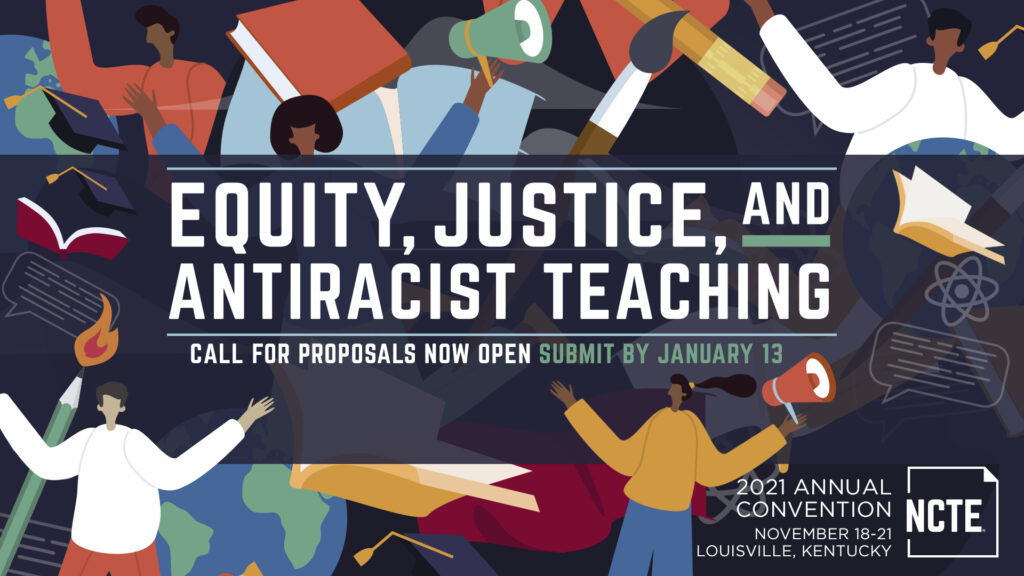The 2021 NCTE Annual Convention will take place November 18–21, 2021. In this post, NCTE President-Elect and 2021 Program Chair Valerie Kinloch shares more about the Convention theme and proposal review process.
Our Theme and Why It Matters
What a joyous time I had at our most recent NCTE Convention, where I witnessed how our members came together in a virtual environment to bring to life Alfredo’s theme of “¡Confluencia!: Songs of Ourselves.” I was excited to listen to the conversation between Patrisse Khan-Cullors, artist, freedom fighter, and cofounder of Black Lives Matter, and Jeff Chang, hip-hop journalist and founding editor of Colorlines Magazine. They talked about teaching as struggle and survival, about human rights and voting, and, to borrow the words of Khan-Cullors, about “freedom portals.”
I love her words, “freedom portals,” because they encapsulate the vision I have for our 2021 Convention, slated for Louisville, Kentucky. At the conclusion of the question-and-answer session with Patrisse, Jeff, and me, I announced that the theme for our 2021 NCTE Annual Convention is “Equity, Justice, and Antiracist Teaching.” To introduce my theme, I grounded it in writings by poet, educator, and activist June Jordan. Then I referenced the last line from her “Poem for South African Women” which states, “we are the ones we have been waiting for.”
Because “we are the ones we’ve been waiting for,” the time is now for us to collectively examine our commitments to equity, justice, and antiracist teaching. I invite you to join me—wherever, whoever, and however you are—to reimagine literacy and English language arts through the lens of equity, justice, and antiracism. Join me to envision what Patrisse Khan-Cullors’s “freedom portals” could look like in our teaching, research, and engagements. Join me in moving toward cocreating a healthy, more just world for our students, families, and ourselves.
This is a Convention for all of us to participate in. We invite teachers, researchers, and leaders from K–12 and higher education contexts as well as new colleagues collaborating with families and working in schools, communities, and other learning contexts to participate. We acknowledge that there will be a span of experiences and viewpoints. This Convention is an opportunity, a call to gather to learn, and an invitation to push our practice in accordance with our theme and in relation to wherever we all are in 2021. It is up to us, all of us, to move literacy education forward in more equitable, just, and antiracist ways.
Reviewers and Selection Process
For our 2021 Annual Convention, I invite you to contemplate the following ideas (visit here for more details about the call for proposals):
- What equity is inside classrooms, schools, and communities, and for children, youth, and families, especially in the face of systemic racism;
- What justice requires from literacy educators and researchers in light of movements for equality, freedom, and liberation; and
- What antiracist teaching means in our curricular choices and in our daily interactions with students and each other.
This framing is meant to serve as a guide into our “freedom portal” of imagining, reimagining, designing, redesigning, and enacting equity, justice, and freedom in our work.
In terms of the selection process, these are the very same questions, among others, that reviewers will be encouraged to contemplate—based on their criticality and critical consciousness—as they evaluate proposals. NCTE’s review structure accounts for three levels of peer review. Stage 1 relies on NCTE member volunteers from across our membership. Stage 2 relies on levels (elementary, middle, secondary, college), members of the NCTE Executive Committee, and volunteer leaders representing each content strand. Stage 3 reviewers will be invited from across NCTE. Final decisions are made by reviewers representing NCTE’s sections and convention strands alongside the program chair. All reviewers will be asked to keep the theme in mind, particularly as tied to educational realities and the theme’s vision to reflect humanizing possibilities.
We invite every interested member to consider reviewing proposals for Stage 1. Reviewing proposals is an excellent way to learn about the content and get involved in our organization. In alignment with NCTE’s formal processes, I will also invite additional reviewers from: our Caucuses (e.g., the American Indian Caucus, Asian/Asian American Caucus, Black Caucus, Jewish Caucus, and Latinx Caucus) and our Assemblies, Affiliates, and Sections. I will extend invitations to past and current members of the Cultivating New Voices Among Scholars of Color (CNV) mentoring program, the Professional Dyads and Culturally Responsive Teaching cohorts (PDCRT), the Early Career Educator of Color Leadership Award participants, and to past and current members of our Presidential Team, Executive Committee, and the NCTE Committee Against Racism and Bias in the Teaching of English. Also, I will invite past and current recipients of NCTE’s Advancement of People of Color Leadership Awards, NCTE’s Leadership Award for People with Disabilities, and NCTE’s LGBTQ+ Advocacy and Leadership Awards (see ncte.org/awards/ncte-leadershift-awards). If you would like to be a reviewer, please indicate your interest (by Jan. 4) by clicking here.
Another example of how this is our shared work and our shared priority: All reviewers will receive the following NCTE position statements. These will be discussed among the group of Stage 3 reviewers in February, as final decisions are being made:
- Statement on Indigenous Peoples and People of Color (IPOC) in English and Language Arts Materials;
- Statement on Anti-Racism to Support Teaching and Learning; and
- Statement on the Opportunity to Learn
As an organization, we appreciate that our reviewers volunteer their time while also preparing to enter into a new semester under challenging teaching and learning conditions. We know that NCTE is a community of lifelong learners. This year, all reviewers will have access to a curated reference list that will help to further inform our reviewers’ understandings and perspectives of the theme. These will include readings by Rick Ayers, Cherry A. McGee Banks, James A. Banks, April Baker-Bell, Durell M. Callier, Kimberlé Crenshaw, Gloria Ladson-Billings, Tamara Butler, Travis Bristol, Antero Garcia, Dominque C. Hill, June Jordan, Jung Kim, Bettina Love, Dinorah Sanchez Loza, Danny Martinez, Brian Mooney, Ernest Morrell, Gholdy Muhammed, Bree Picower, Grace D. Player, Detra Price-Dennis, Timothy San Pedro, Yolanda Sealy-Ruiz, Christine Sleeter, Ebony Elizabeth Thomas, Estrella Torrez, and among others, the #Disrupt Texts founders and community.
Next Steps
Submit your proposals. Encourage your colleagues, students, and friends to submit proposals, too. Be willing to be uncomfortable with what you might not yet know. Be vulnerable enough to wonder aloud and with others and to move yourself into a place of critical thought and action. Willingly come together to talk about, share, and exchange stories about struggles, shortcomings successes, and free falls.
It is my hope that we will collectively examine our teaching and discuss our research. That we will enter conversations wherever we are in our learning and in our knowing. That we will embrace opportunities to have necessary and difficult conversations about literacy and English language arts. That we will leave more knowledgeable, invested, challenged, and involved in the work of equity, justice, and antiracist teaching with students, with families, with communities, and with each other.
The vast program that comprises NCTE’s 2021 Convention will represent a multiplicity of views, a wide range of experiences and levels in literacy education, and so much diversity. We will learn and grow together in the theme of “Equity, Justice, and Antiracist Teaching.”
In Closing
As literacy and English language arts educators and researchers, I hope we will consider, for example, ways to demonstrate our unwavering commitment to equity and justice in our literacy teaching, research, and engagements; how we design curricula on freedom and human rights; what a commitment to equity, justice, and antiracism would mean for students and, by extension, for their families, their communities, and their future selves; ways we can ensure that our literacy work does not reproduce inequities, injustices, and racism; and what responsibility NCTE and our members have to lead this work.
We all need to engage in this work with everyone pushing forward. This Convention calls for your participation, presentation, and attendance.
Submit your proposals, contribute to the conversations, and join me for NCTE 2021!
“We are the ones we have been waiting for.”

Valerie Kinloch
NCTE President-Elect and 2021 Program Chair

